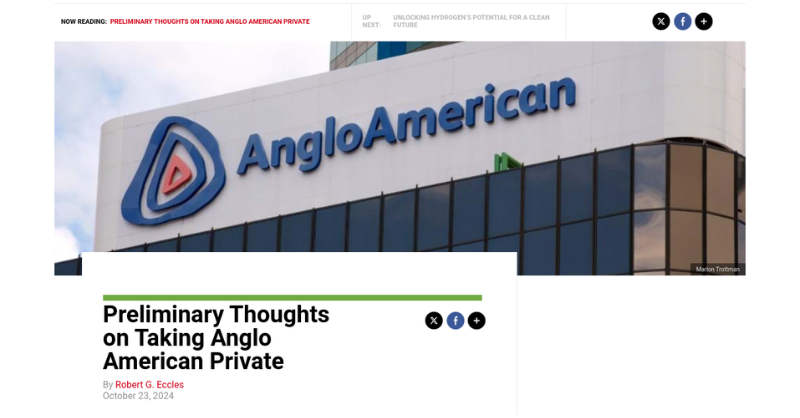
Sunday Brunch: Might taking Anglo American private be good for sustainability?
Would taking a mining company private help with sustainability? Or could we achieve the same outcome with a material minority holding?
Is the mining industry's ability to properly invest in the sustainability transitions being restricted by their public ownership. Could going private be the solution, or do we need to look at a different way of investing?
If you follow the mining industry, even in a casual way, you will have seen a lot of financial press and industry discussion on the future of the global miner Anglo American (Anglo).
Regular readers will know that we have consistently argued that the world is probably going to need more of the key transition minerals. These are the raw materials that will enable us to build all of the EV's, solar & wind farms, and of course all of the new electricity grid infrastructure that we are going to need. And this will mean more mining of some minerals.
What does this have to do with Anglo? The short answer is copper, where the company is a top 5 global producer. And part of the longer answer is iron ore, where the company has access to the higher ore grades needed for some green steel production technologies. We want Anglo to keep developing new copper and high grade iron ore supply.
What might stop Anglo doing this? Shareholder pressure.
Opening new mines is challenging. It can take years (or decades). And this brings uncertainty. Which is something that the already cyclical mining sector could do without. And let's be honest, the mining industry often doesn't have a good track record at generating financial value from big green field projects or from large scale M&A.
Partly as a result of these factors some shareholders prefer the mining companies to be big dividend payers. Turning existing assets into cash, and returning a good part of that to shareholders. Mining companies face real pressures not to 'over invest' in what some shareholders see as value destroying new projects or material M&A.
Given the critical role that some mining companies will play in enabling the sustainability transitions, it makes sense that sustainable investors will want to be invested in them. And as part of this investment encourage them to prepare for the future by investing in projects such as new copper mines.
But this can bring conflict with some traditional mining investors, who want lower risk and higher dividends. This problem can potentially go away if the company is taken private, shifting the focus from meeting current investors expectations to creating long term financial and sustainability value.
But going fully private is a complex process, so maybe taking a large minority share position would be enough?
Preparing for a surge in copper demand
There are a few reasons why we have focused on Anglo. The first is that, to use an industry phrase, the company seems to be 'in play'. BHP made an offer for the company back in April. And while it was rejected by Anglo (partly because of the complexity of the offer), many analysts think that either BHP will bid again (once Anglo has completed some divestments) or another bidder will emerge.
The second is the company's likely future positioning in relation to the sustainability transitions. At its recent investor presentation, the company highlighted that by 2030 they are aiming for the business to be almost totally focused on copper and high grade iron ore (54% and 46% respectively by production) plus Crop Nutrients (Woodsmith).
The third is a recent article written by Robert G Eccles. In it he suggested that a group of large pension funds and sovereign wealth funds could together raise the funds to take Anglo private. And then they could either be long term owners, taking a regular dividend stream, or alternatively use the cashflows the company generates to buy up other, smaller, copper producers. Building a strong company in a growing market segment.

As well as the obvious gain of allowing the company management to focus on long term value creation, rather than the shorter term objectives that some current shareholders seem to have, Robert could see another benefit from going private.
He sees an inherent contradiction between investors wanting the company to continue to generate profits, and at the same time commit to net zero. To quote the article:
While the company may be able to lower its emissions intensity, its absolute emissions will inevitably increase as it increases its capacity. And, unlike oil and gas, no one is calling for a halt of copper production.
Could slimming down the Anglo portfolio help reduce emissions ?
When considering this point, it's worth looking at Anglo's GHG emissions. According to the company's latest climate change report, the vast majority of their total GHG emissions are scope 3. This is consistent with the mining industry average. And the bulk of these in Anglo's case come from steel making coal and iron ore (c. 76%). Copper comes into 'other products', which is only (in total) 12% of the company's scope 3 emissions.
If green steel happens as many think it will, then steel making coal will be phased out, and the iron/steel making process could generate materially less GHG emissions. This could mean that there is a real pathway to Anglo massively reducing its total emissions, even if it mines a lot more copper.
So - why 'interfere'? Just let the financial markets do their job
At this point it's worth considering why sustainability investors might want to be more active. Yes, the current Anglo management is already advocating a slimmed down portfolio, focused on copper, high grade iron ore and crop nutrients. But, there is no guarantee that this proposed structure actually happens, especially if the company is acquired by say BHP.
BHP seems to take a different view on the future of green steel, one that is still dominated by the BF-BOF technology. So they could take a different view on how the Anglo portion of the portfolio should look, and which technologies they will support and lobby for.

By taking Anglo private, sustainability investors could act to protect the current Anglo managements strategy - one that seems to offer good financial value and the potential for lower GHG emissions.
But, taking Anglo fully private is tough.
Taking Anglo private would probably require a bid higher than the last BHP offer (at the time c. US$49 billion). Yes, there are some very large pension and sovereign wealth funds. In his article Robert G Eccles highlights six of the bigger funds (three large pension funds - CalPERS, CalSTRS, and CPPIB, and three large sovereign wealth funds - GIC, Mubadala, and Temasek). Between the six of them they’ve apparently allocated $675 billion to private equity, and so in principle buying Anglo is possible.
But, from experience, I know that just having one bidder involved in an M&A battle is tough, getting six or more to agree on the right price and terms would be really challenging. Not impossible, but challenging.
One alternative would be to keep Anglo as a publicly listed company, with a new sustainable fund taking say a 29% stake. At the current share price that would cost c. US$12 billion. If the fund had say 10 large investors that would be c. US1 billion each. And 29% would give the fund a massive influence over the company, and act as a deterrent to an opportunistic bid. Especially as, according to the FT, the South African Public Investment Fund, together with the South African government, already own another c. 11.2% of Anglo.
Yes, there are a lot of practical hurdles to overcome. The fund would need to be set up to comply with regulatory requirements around controlling shareholdings. Buying that volume of shares (29%) would not be easy. And we would need to persuade the other large shareholders to back the strategy.
But, at a time when the various expert bodies, such as the UN Environment Programme, are highlighting how little real progress we have made in terms of reducing global GHG emissions, we need to find different ways of acting. Maybe it's time to be direct, to mobilise sustainability capital in a very focused, pin point way.
Two last thoughts
Cuts in GHG emissions of 42% are needed by 2030 and 57% by 2035 to get on track for 1.5°C. A failure to increase ambition in these new NDCs and start delivering immediately would put the world on course for a temperature increase of 2.6-3.1°C over the course of this century. - Emissions Gap Report 2024.
'Insanity is doing the same thing over and over again and expecting different results' - attributed to Einstein but more likely to have been said after his death.
Please read: important legal stuff.


